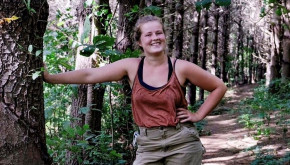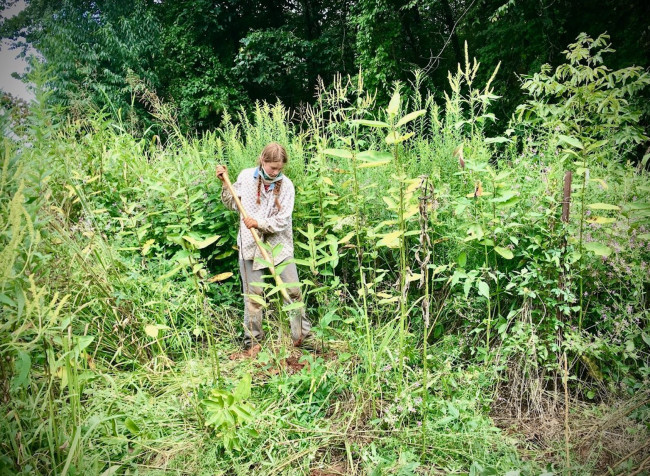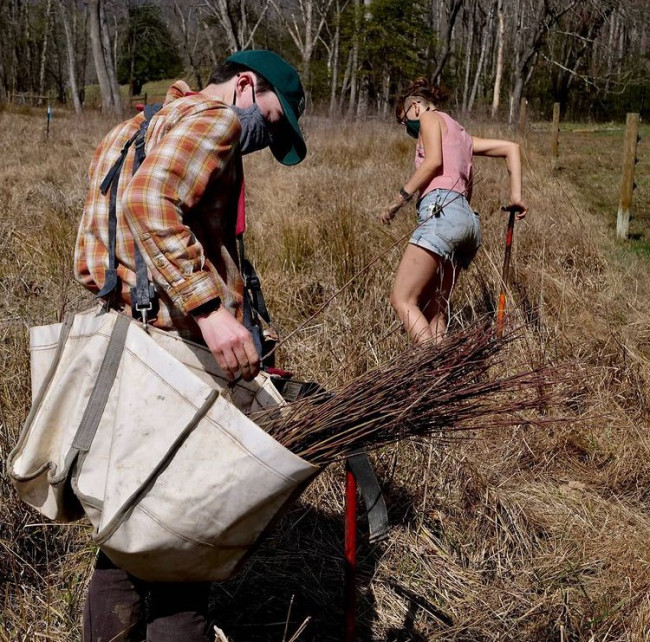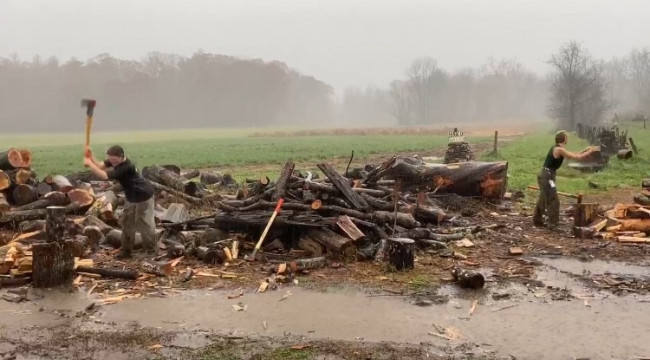
By Dakota Wagner; photos by Corinna Steinrueck
Corinna Steinrueck is the Land Stewards Fellow at Warren Wilson College in Asheville, North Carolina. She describes her position as “supporting future land stewards by teaching integrative land management methods.” In this context, integrative land management is a strategic, collaborative approach to managing land in a holistic way that includes traditional forest management, agriculture, agroforestry practices, and everything in between.
In her position, Corinna is in charge of a student crew of around 20 students. This is a part of a larger Work Program model that the college follows, where resident students are required to work at least ten hours a week on their designated campus work crew. There are dozens of work crews, with four of them focused on land management: Forestry, Farm, Garden, and the Land Stewards Crew.
On the Land Stewards Crew, Corinna leads her students in supporting the other land crews with projects such as invasive species control, trail maintenance, cultivation of perennial polycultures and pollinator gardens, and vegetable production. A big part of the crew’s work is also focused on building and maintaining infrastructure across the land operations. Such projects have included fence building, cattle plumbing, the construction of the solar kiln for drying lumber, and building a new shade house for propagating forest medicinal plants. Each week, Corinna leads a crew training that focuses on a specific topic. These topics have ranged from forest ecology to understanding how 2-stroke engines work (think: weed whackers and chainsaws).
Corinna was first interested in forestry because she loves spending time in the woods and is fascinated in understanding how ecosystems function. Working in small-scale land management and education aligns with her skillset and passions and allows her to fulfill her desire to give back and protect the ecosystems she cares deeply about.
Corinna has lived in the forests of New England and the Southern Appalachians, but she says she prefers the mountainous Southern Appalachians because of their unique biological diversity – and that this richness leads to the forests feeling sacred. “This might sound cheesy, but something about these forests feel more alive and like they hold a lot of wisdom,” she says.
When asked about the challenges that professional women in natural resources face, Corinna says one of the first things that comes to mind is having your knowledge and skills be constantly questioned. Especially when working with new colleagues, she feels that women are scrutinized and not taken as seriously as male counterparts; they often need to go to greater lengths to “prove themselves”. This can also be a difficult hurdle for women landowners, too.
Some advice she has for women and other “non-traditional” natural resource professionals entering the field is to “create a well-rounded experience for yourself. Learn about soils, climate, and what makes the forest ‘tick’ as well as learning about tools and how to use them.”
Before wrapping up our conversation, I asked Corinna what she would like to see in the forests where she lives. She says that when she thinks about the future of Southern Appalachian forests specifically, she would like to see more prescribed fire on the ground where it has been excluded in the past several decades. But when she thinks about her current students and other future land stewards, she would like to see more holistic and collaborative approaches to land stewardship. She would also like to see more relationships fostered between logging companies, landowners, and conservation organizations.
Particularly when it comes to women landowners, she hopes to see increased opportunities for them to engage with resource professionals and grow their confidence to be a part of that integrative land management decision-making process.




